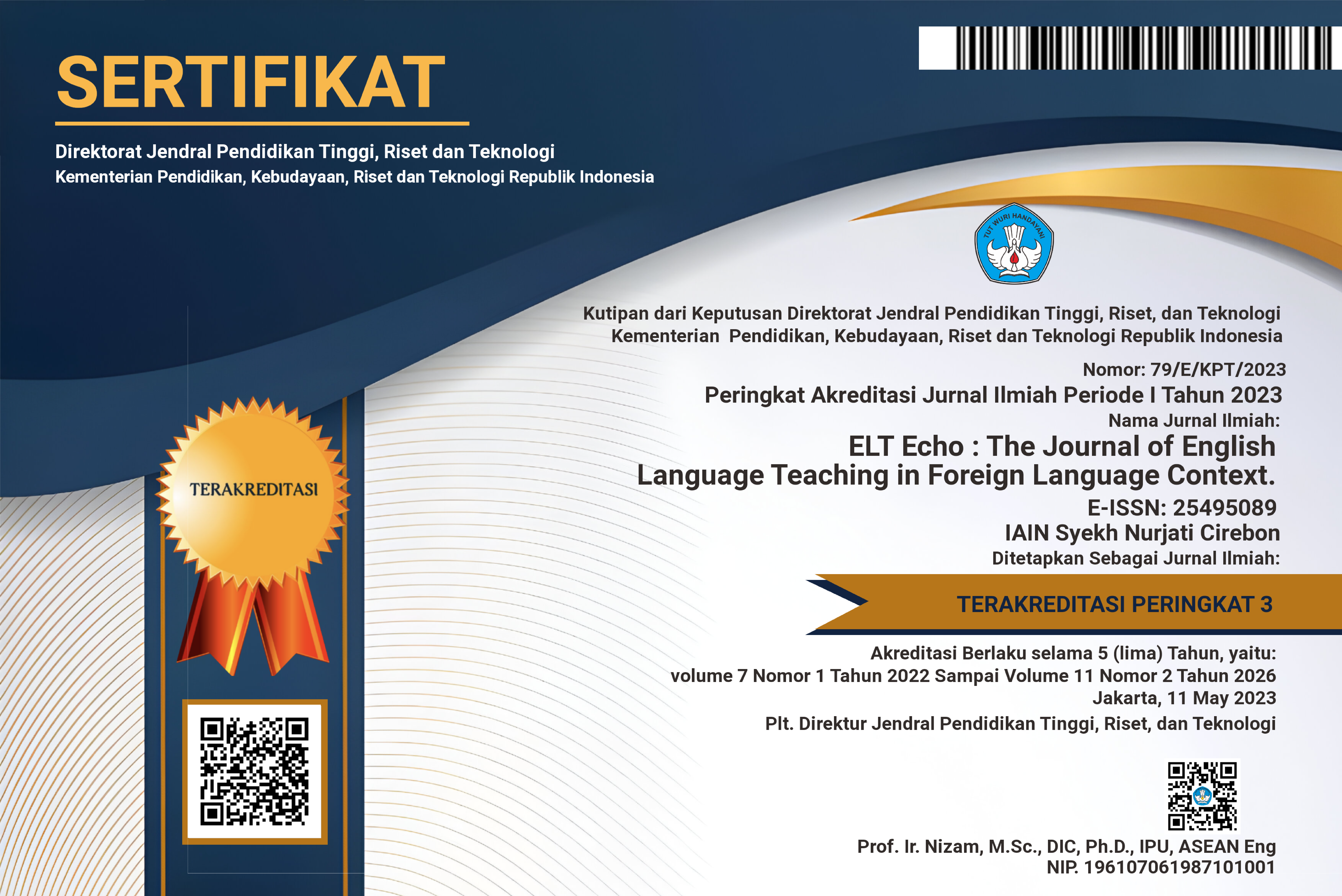THAI UNIVERSITY STUDENTS’ ATTITUDES TOWARDS ELF IN CLASSROOM CONTEXTS: A MIXED-METHODS STUDY
(1) Xavier Learning Community
(2) Sanata Dharma University
(*) Corresponding Author
Abstract
English has long acted as a powerful language in the world since it is spoken by various people from diverse cultural backgrounds and places around the globe. As a number of non-native speakers (NNSs) are rapidly growing, English as a Lingua Franca (ELF) has become more widespread among English users. This study aimed to investigate Thai university students’ attitudes towards ELF. Particularly, attitudes towards learning English, varieties of English, and ELF used as a medium of instruction in the classroom were examined. Employed a mixed-methods research design, the questionnaire and semi-structured interview were used to collect the data. 23 undergraduate students studying at Xavier Learning Community (XLC), Chiang Rai, Thailand, participated in this study. The findings revealed that effective communication with other English speakers was the paramount goal of learning English. Moreover, the students have begun to express positive attitudes towards different varieties of English used in the classroom as they showed their interest in non-native cultures. This study suggested that supportive learning environments where the students could expose to various varieties of English both inside and outside the classroom would raise their awareness of ELF. Also, ELF teachers should adjust their teaching strategies to meet students’ needs in the future.
Keywords
Full Text:
PDFReferences
Acharya, B. (2010). Questionnaire design. Nepal: Nepal Engineering College.
Baker, W. (2012). English as a lingua franca in Thailand: Characterisations and implications. Englishes in Practice, 1(1), 18-27.
Bolton, K., & Kuteeva, M. (2012). English as an academic language at a Swedish university: Parallel language use and the ‘threat’of English. Journal of Multilingual and Multicultural Development, 33(5), 429-447.
Borghetti, C., & Beaven, A. (2017). Lingua francas and learning mobility: Reflections on students’ attitudes and beliefs towards language learning and use. International Journal of Applied Linguistics (United Kingdom), 27(1), 221–241. https://doi.org/10.1111/ijal.12123
Crystal, D. (2012). English as a global language. Cambridge university press.
Dogancay-Aktuna, S., & Hardman, J. (2017). A framework for incorporating an English as an international language perspective into TESOL teacher education. Preparing teachers to teach English as an international language, 19-34.
Firth, A. (1996). The discursive accomplishment of normality: On “lingua franca†English and conversation analysis. Journal of Pragmatics, 26(2), 237–259. https://doi.org/10.1016/0378-2166(96)00014-8
Forza, C. (2002). Survey research in operations management: A process-based perspective. International Journal of Operations and Production Management, 22(2), 152–194. https://doi.org/10.1108/01443570210414310
Gardner, R. C., & Lambert, W. E. (1972). Attitudes and motivation in second language learning. Rowley, MA: Newbury House Publishers.
Groom, C. (2012). Non-native attitudes towards teaching English as a lingua franca in Europe. English Today, 28(1), 50-57.
House, J. (1999). Misunderstanding in intercultural communication: Interactions in English as a lingua franca and the myth of mutual intelligibility. Teaching and learning English as a global language, 73-89.
Ishikawa, T. (2017). Japanese university students’ attitudes towards their English and the possibility of ELF awareness. Journal of English as a Lingua Franca, 6(2), 237–263. https://doi.org/10.1515/jelf-2017-0012
Jenkins, J. (2006). Current perspectives on teaching world Englishes and English as a lingua franca. TESOL Quarterly, 40(1), 157. https://doi.org/10.2307/40264515
Jenkins, J. (2009). English as a lingua franca: Interpretations and attitudes. World Englishes, 28(2), 200-207.
Jensen, C., Denver, L., Mees, I. M., & Werther, C. (2013). Students’ attitudes to lecturers’ English in English-medium higher education in Denmark. NJES Nordic Journal of English Studies, 12(1), 87–112. https://doi.org/10.35360/njes.277
Johnson, R. B., Onwuegbuzie, A. J., & Turner, L. A. (2007). Toward a definition of mixed methods research. Journal of mixed methods research, 1(2), 112-133.
Jokilehto, E. (2014). ELF in the classroom: Finnish upper secondary school students’ attitudes towards ELF. (March).
Kachru, B. (1985). Standards, codification and sociolinguistic realism: The English language in the outer circle. English in the world: teaching and learning the language and literatures, 11-30.
Kanoksilapatham, B. (2013). Thai university students’ voices heard: Aspired pronunciation model. Journal of Studies in the English Language, 8.
Ke, I. C., & Cahyani, H. (2014). Learning to become users of English as a Lingua Franca (ELF): How ELF online communication affects Taiwanese learners’ beliefs of English. System, 46(1), 28–38. https://doi.org/10.1016/j.system.2014.07.008
Kirkpatrick, A. (2011). English as an Asian lingua franca and the multilingual model of ELT. Language Teaching, 44(2), 212–224. https://doi.org/10.1017/S0261444810000145
Kongkerd, W. (2013). Teaching English in the era of English used as a lingua franca in thailand. Executive Journal, 4, 3–12.
Lopriore, L., & Vettorel, P. (2015). International perspectives on English as a lingua franca. International Perspectives on English as a Lingua Franca, (March 2017). https://doi.org/10.1057/9781137398093
Luangpipat, N., & Padgate, W. (2015). The relationship between English learning achievement and perceived self-efficacy of the first-year students at Naresuan University. Journal of Foreign Language Teaching and Applied Linguistics, 2(2), 207–216. https://doi.org/10.14706/jfltal152218
Matsuda, M. K., & Matsuda, M. K. (2012). Pacific worlds: A history of seas, peoples, and cultures. Cambridge University Press.
Nomnian, S. (2013). Thai cultural aspects in English language textbooks in a Thai secondary school. Veridian E-Journal: International, 6(7), 13–30.
Nomnian, S. (2014). English as the ASEAN lingua franca in Thai higher education. Veridian E-Journal, 7(4), 75–84.
Noom-Ura, S. (2013). English-teaching problems in Thailand and Thai teachers' professional development needs. English Language Teaching, 6(11), 139-147.
Oppenheim, B. (1982). An exercise in attitude measurement. In Social psychology (pp. 38-56). Palgrave, London.
Phusit, N., & Suksiripakonchai, W. (2018). A study of Thai university students’ attitudes towards pronunciation models in English as a lingua franca. International Journal of Social Science and Humanity, 8(1), 20–24. https://doi.org/10.18178/ijssh.2018.v8.927
Punthumasen, P. (2007, December). International program for teacher education: An approach to tackling problems of English education in Thailand. In The 11th UNESCO-APEID international conference reinventing higher education: Toward participatory and sustainable development (pp. 12-14).
Seidlhofer, B. (2011). Conceptualizing ‘English’for a multilingual Europe. English in Europe today: Sociocultural and educational perspectives, 133-146.
Somsai, S., & Intaraprasert, C. (2011). Strategies for coping with face-to-face oral communication problems employed by Thai university students majoring in English. GEMA Online Journal of Language Studies, 11(3), 83–96.
Thon, S. (2017). The use of English in an English as a lingua franca (ELF) context: A case study of ASEAN international students at a Thai university (Doctoral dissertation, Prince of Songkla University).
Ulla, M. B. (2018). English language teaching in Thailand: Filipino teachers' experiences and perspectives. Issues in Educational Research, 28(4), 1080.
Wang, D. (2013). The use of English as a lingua franca in teaching Chinese as a foreign language: A case study of native Chinese teachers in Beijing. In Language alternation, language choice and language encounter in international tertiary education (pp. 161-177). Springer, Dordrecht.
Wiriyachitra, A. (2002). English language teaching and learning in Thailand in this decade. Thai TESOL focus, 15(1), 4-9.
Wongsothorn, A., Hiranburana, K., & Chinnawongs, S. (2002). English language teaching in Thailand today. Asia pacific journal of education, 22(2), 107-116.
DOI: 10.24235/eltecho.v6i1.7317
Article Metrics
Abstract view : 61 timesPDF - 15 times
Refbacks
- There are currently no refbacks.
Â
This Journal is indexed by:
Â

This work is licensed under a Creative Commons Attribution 4.0 International License.










